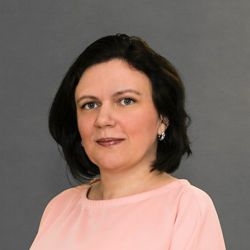Practicing teachers with experience in the RF Ministry of Foreign Affairs, the United Nations, native speakers
The graduating department is the Department of Foreign Languages of the Faculty of Philology. Among the teachers there are native speakers and professional simultaneous interpreters who have worked at the UN, the RF Ministry of Foreign Affairs, and conduct classes aimed at practicing simultaneous translation skills in real conditions.

FEEDBACKS
My career in sports and sports diplomacy began with the first year of study at the Faculty of Philology, when our English teacher Milana Kuprianova started a program “Volunteer translator at sports events”. Since then, my path has been connected with sports and languages. Dozens of events where I worked every month provided invaluable experience and acquaintances that led me to the Russian Martial Arts Union. My friendship with RUDN did not end with graduation. No event took place without the participation of students of the Department of Foreign Languages of the Faculty of Philology. Active and energetic, inquisitive and sociable, students have excellent skills in intercultural communication, which is sometimes more important than an impeccable knowledge of theoretical subjects. The great advantage of the students is proficiency in two foreign languages. I am sure that our cooperation will only expand, because every year we hire several graduates, and also recommend them to other sports federations..
Foreign languages are what opens new doors for you. This program gives you the opportunity to try your hand at interpreting, translation and teaching foreign languages. The atmosphere of the classes is conducive to learning new and unknown things, and teachers very often use case-study from their professional lives, talking about techniques and life hacks in translation and teaching. The great advantage of the program is that it meets the requirements of the market and allows students to combine work and study so that, as a result, the student has hard-skills acquired at university and soft-skills acquired at work. I definitely recommend the program to all applicants who are not going to stop there!
When I went to Russia, I was very afraid that I would not be able to study here, that I would face misunderstanding from teachers, and I would not be able to find friends. But it turned out that Russians are very friendly, always ready to help, and RUDN is generally a separate world where the word “friendship” takes on a new meaning. I am learning Russian and I want to be able to translate from Russian into French, my native language. I attended simultaneous translation classes with students studying French as a foreign language and tried very hard. I am glad that we have such wonderful teachers who will always support and help. Of course, it was difficult for me, sometimes I was very nervous and worried, but Russian students always came to my aid, supported me, and I succeeded! I really liked the simultaneous translation course, and if I had the opportunity again, I would come here, to RUDN, to Russia, once again, and would choose this course again.
I came to Russia to learn more about the Russian language and translation from Russian into French, from Russian into English and back. I studied Russian with other foreigners in different groups with different levels. I was surprised to notice that the language of international communication here is Russian, not English. Thus, a person needs to master Russian in order to communicate. To be honest, I have never seen such a mixture of people and peoples, and I am glad that I had the opportunity to meet so many different people..